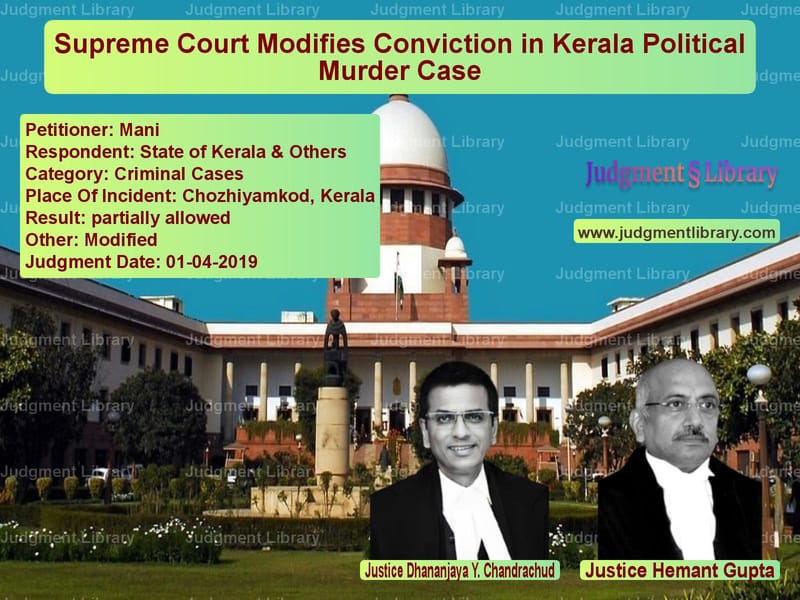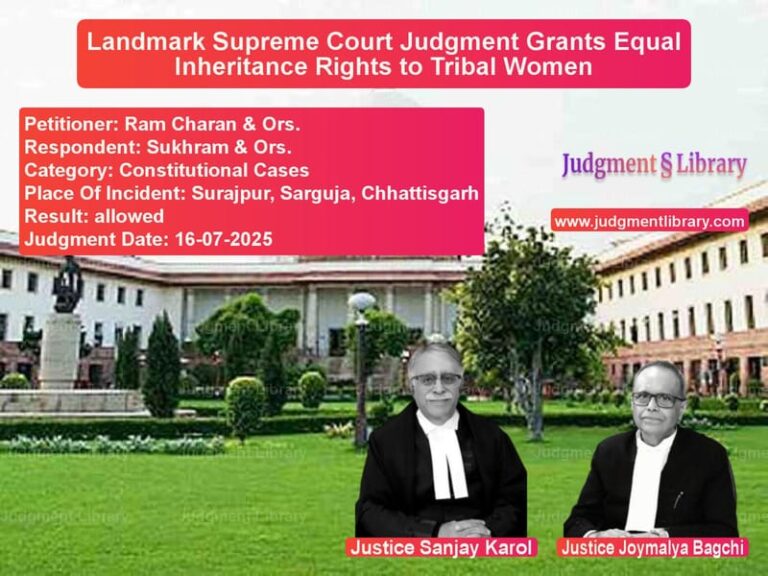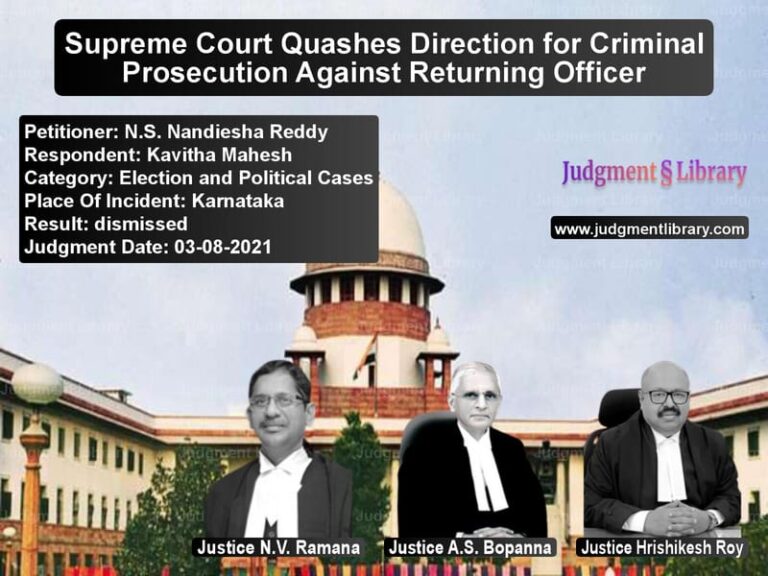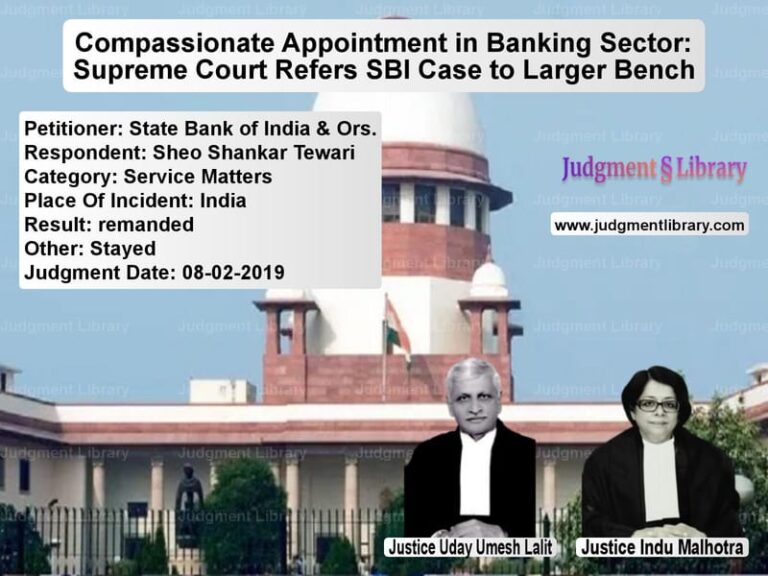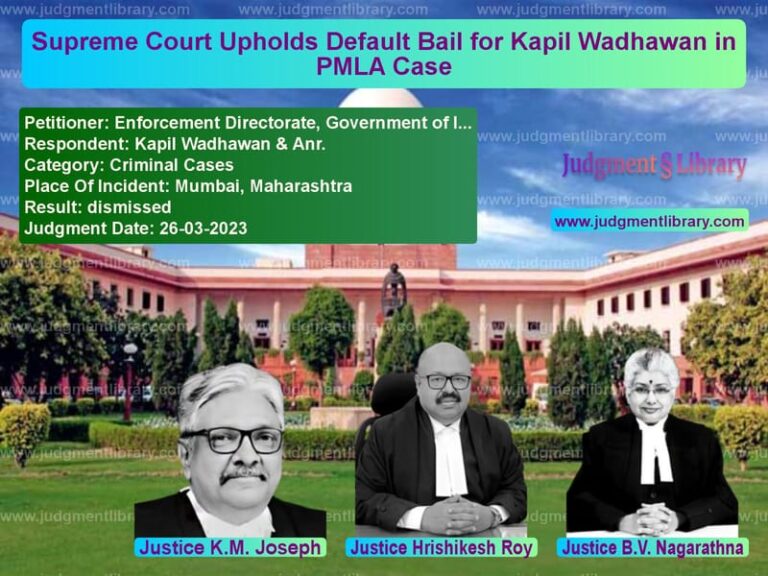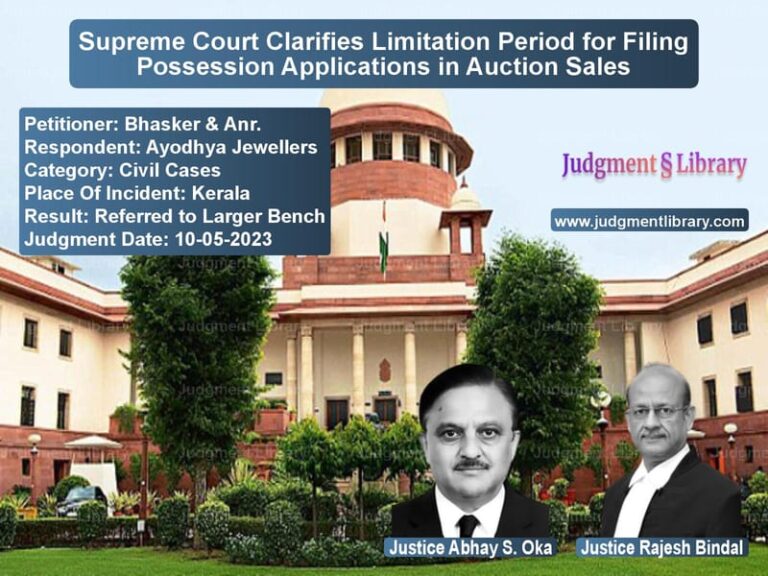Supreme Court Modifies Conviction in Kerala Political Murder Case
The case of Mani v. State of Kerala & Others revolved around a political murder that took place in Kerala due to enmity between members of two rival political parties. The Supreme Court modified the conviction of the appellant, Mani, from murder (Section 302 IPC) to culpable homicide not amounting to murder (Section 304 Part I IPC), reducing his sentence to the period already served. The Court, however, upheld the convictions of the other accused for lesser offenses.
This judgment highlights the principles of common intention, right to private defense, and the application of Exception 4 to Section 300 IPC, which deals with cases of sudden fights without premeditation.
Background of the Case
On 28th September 2005, an altercation between members of two political parties—BJP and CPM—resulted in the fatal stabbing of one individual named Soman. The prosecution alleged that Mani, along with three co-accused (Rathnakumar, Praveen, and Selvaraj), had attacked the victim and his group due to political rivalry.
The incident occurred at around 8:10 PM near Rosy School, Chozhiyamkod, when the accused, armed with weapons including a knife, Vadival sword, and an iron rod, allegedly intercepted the victim’s group and launched an attack. The prosecution claimed that Mani stabbed Soman in the chest while the other accused inflicted injuries on the victim’s companions.
The trial court convicted all four accused under Section 302 read with Section 34 IPC (common intention) and sentenced them to life imprisonment. However, the Kerala High Court, upon appeal, found that only Mani was guilty of murder while the other three accused were liable for lesser offenses under Sections 324 and 341 IPC.
Key Legal Issues
- Whether the appellant acted with premeditation or in the heat of passion during a sudden fight.
- Whether the other accused shared a common intention to commit murder.
- Whether the appellant could claim the right of private defense.
Arguments by the Appellant (Mani)
- He acted in self-defense as he was attacked first by the victim’s group, which outnumbered the accused.
- There was no premeditation, and the fight occurred spontaneously.
- The prosecution’s version was inconsistent regarding the roles of the accused.
- At most, his act should fall under Section 304 IPC instead of Section 302 IPC.
Arguments by the Respondents (State of Kerala)
- Mani was the instigator and exhorted his co-accused to attack the victims.
- The accused acted in furtherance of a common intention to commit murder.
- There was no immediate provocation from the victim’s side.
- Mani’s injuries were minor, indicating that he was not under serious threat.
Supreme Court’s Observations and Judgment
The Supreme Court carefully examined the facts, witness statements, and medical evidence before modifying the conviction.
Key observations:
- The altercation was sudden, with no clear evidence of pre-planning.
- Both parties were politically opposed and had previous confrontations.
- The attack by the accused was provoked by an argument rather than premeditated intent.
- The nature of the injury inflicted by Mani was severe, but the act itself lacked the hallmarks of a planned murder.
- The other accused did not share a common intention to kill the victim and were rightly convicted of lesser offenses.
Key Judgment Excerpt:
“The accused had no knowledge or information that the victims were moving towards Chozhiyamkod. The prosecution witnesses have deposed that the accused or the victims did not have any personal enmity except political differences. The appellant was suddenly confronted with the victims and in the fight ensued in which the injuries came to be inflicted upon the deceased and other victims.”
Based on these findings, the Court ruled that Mani’s actions fell under Exception 4 of Section 300 IPC, which states that culpable homicide does not amount to murder if the death is caused in a sudden fight without premeditation. Therefore, the Court modified the conviction from Section 302 IPC to Section 304 Part I IPC and reduced the sentence to time already served.
The conviction of the co-accused under Sections 324 and 341 IPC was upheld.
Implications of the Judgment
- The ruling sets a precedent for determining intent in cases involving sudden political violence.
- It reinforces the principle that the right of private defense cannot be claimed if the response is disproportionate.
- The judgment clarifies that common intention must be established through direct evidence.
Conclusion
This ruling balances justice by recognizing that the crime occurred in the heat of passion while ensuring that political violence is not excused outright. The Supreme Court’s decision provides clarity on legal standards for sudden fights and their implications on criminal liability.
Petitioner Name: Mani.Respondent Name: State of Kerala & Others.Judgment By: Justice Dhananjaya Y. Chandrachud, Justice Hemant Gupta.Place Of Incident: Chozhiyamkod, Kerala.Judgment Date: 01-04-2019.
Don’t miss out on the full details! Download the complete judgment in PDF format below and gain valuable insights instantly!
Download Judgment: Mani vs State of Kerala & Ot Supreme Court of India Judgment Dated 01-04-2019.pdf
Direct Downlaod Judgment: Direct downlaod this Judgment
See all petitions in Murder Cases
See all petitions in Bail and Anticipatory Bail
See all petitions in Attempt to Murder Cases
See all petitions in Judgment by Dhananjaya Y Chandrachud
See all petitions in Judgment by Hemant Gupta
See all petitions in partially allowed
See all petitions in Modified
See all petitions in supreme court of India judgments April 2019
See all petitions in 2019 judgments
See all posts in Criminal Cases Category
See all allowed petitions in Criminal Cases Category
See all Dismissed petitions in Criminal Cases Category
See all partially allowed petitions in Criminal Cases Category

